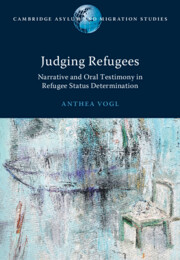Book contents
- Judging Refugees
- Cambridge Asylum and Migration Studies
- Judging Refugees
- Copyright page
- Contents
- Foreword
- Acknowledgements
- Abbreviations
- 1 Introduction
- 2 Law, Literature and Narrative in the RSD Oral Hearing
- 3 How Did We Get Here? A History of the Oral Hearing in Australia and Canada
- 4 The Stock Narrative of Becoming a Refugee
- 5 Narrative Contest as Structuring the Oral Hearing
- 6 ‘I’ll Just Stop You There’: Fragmentation of Refugees’ Oral Testimony
- 7 Beyond the Demand for Narrative: Genres of Refugee Testimony
- 8 Conclusion
- Appendix
- Index
1 - Introduction
Published online by Cambridge University Press: 15 March 2024
- Judging Refugees
- Cambridge Asylum and Migration Studies
- Judging Refugees
- Copyright page
- Contents
- Foreword
- Acknowledgements
- Abbreviations
- 1 Introduction
- 2 Law, Literature and Narrative in the RSD Oral Hearing
- 3 How Did We Get Here? A History of the Oral Hearing in Australia and Canada
- 4 The Stock Narrative of Becoming a Refugee
- 5 Narrative Contest as Structuring the Oral Hearing
- 6 ‘I’ll Just Stop You There’: Fragmentation of Refugees’ Oral Testimony
- 7 Beyond the Demand for Narrative: Genres of Refugee Testimony
- 8 Conclusion
- Appendix
- Index
Summary
To access refugee protection in Australia and Canada, refugee applicants must speak. They must present their oral testimony in person, repeatedly and at length, unmediated by a legal representative or advocate, and in many cases without the benefit of documents, witnesses or other forms of evidence to verify their claims. This book is about the oral evidence that refugees are compelled to give, the stories they are required to narrate, and the genres of storytelling they are required to master during administrative oral hearings for the assessment of refugee status in Australia and Canada. This introductory chapter establishes the book’s central concerns, namely: what the presentation, interrogation and assessment of testimony during the oral hearing tell us about the refugee subject whom Refugee Convention-signatory states judge as authentic, credible and, ultimately, acceptable. It then carefully connects the demand for narrative within RSD with the intractable problems of credibility assessment. Finally, it interrogates the role of law, lawyers and interpreters in shaping the refugee testimony and analysis presented throughout the book.
Keywords
- Type
- Chapter
- Information
- Judging RefugeesNarrative and Oral Testimony in Refugee Status Determination, pp. 1 - 22Publisher: Cambridge University PressPrint publication year: 2024

